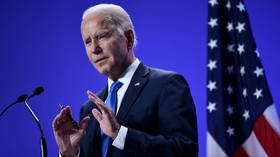'I vet them no different than I vet a terrorist': how the US tracked and blackmailed journalists

An investigation has shed light on how journalists were vetted and threatened by a customs agent supposedly looking into forced labor, but actually seeking leaks related to President Trump and his alleged collusion with Russia.
“It was almost 10pm on a Thursday night, and Ali Watkins was walking around the capital following instructions texted by a stranger. One message instructed her to walk through an abandoned parking lot near Washington, DC’s Dupont Circle, and then wait at a laundromat. Then came a final cryptic instruction: She was to enter an unmarked door on Connecticut Avenue leading to a hidden bar.
“The Sheppard, an upscale speakeasy, was so dimly lit it was sometimes hard to see the menu, let alone a stranger at the bar. But amid the red velvet upholstery, Watkins, then a reporter at Politico, almost immediately spotted the man she was supposed to meet: He was wearing a corduroy blazer and jeans and had a distinctive gap between his teeth.
“‘I won’t tell you my name, but I work for the US government,’ he said, according to her account later provided to government investigators.”
Thus began a long story recently published on Yahoo about a spy operation on members of the press that took place during the time of the Trump administration, which eventually ensnared members of Congress, in an effort to sniff out governmental leaks related to the former president’s alleged collusion with Russia. This, of course, was a claim reported as fact repeatedly by the media, but ultimately never established in the Mueller Investigation report.
Watkins’ meeting was part of a rogue dragnet operation that expanded to involve more than one government agency and ultimately pried into the workings and personal lives of as many as 20 journalists, some of whom had dug up stories on the administration’s failings.
These revelations emerged just before a similar story in which the White House ensnared two members of Congress and several staffers, who claim to have been wrongfully targeted. Details make it appear the rogue spy operation may have fed into that as well, and a number of US news organizations are now demanding answers.
Watkins, a rising star who had gone from Huffington Post to Buzzfeed to Politico during the investigation, agreed to the meeting at the pub, hoping to chat with a member of government who would be a potential source of information.
It turned out the man was more interested in gaining information about her than in providing any. Later, Watkins would say of the meeting that she “was deeply troubled at the lengths CBP [Customs and Border Protection] and DHS [Department of Homeland Security] personnel apparently went to try and identify journalistic sources and dig into my personal life. It was chilling.”
Watkins noted the man seemed to know an awful lot about her, including details of her travels and companionship. Their four-hour meeting changed both of their lives. Her married boyfriend, James Wolfe – who worked on Capitol Hill – was sentenced to two months in prison for lying to the FBI about his relationships with reporters, though Watkins denied Wolfe had ever shared any information with her during their involvement.
As for the mysterious man at the bar? Articles that came out later said Jeffrey Rambo was a rogue actor at DHS during the Trump administration who had taken it upon himself to pursue leaks for glory. Rambo worked in the Customs and Border Protection [CBP] division where lax rules routinely allowed agents to use secret databases to gain information without warrants.
Rambo maintains he operated within the law, and told Yahoo, “I’m being accused of blackmailing a journalist and trying to sign her up as an FBI informant… because of misinformation reported by the news media.”
He was, he claims, assigned to investigate illegal forced labor and came across Watkins when he was looking for journalists who reported on labor abuses. Rambo says he was merely vetting her as a potential reliable source of info. He hoped she could connect him to other journalists or people inside government with knowledge of illegal forced labor.
“There is no specific guidance on how to vet someone,” Rambo later told investigators. “In terms of policy and procedure… there’s no policy and procedure on vetting.”
Rambo is an example of a government agent pulling a dragnet through government databases, looking at the private lives, including the romantic relationships, of US citizens under no suspicion of criminal activity to see what he could unearth.
Hugh Handeyside, an attorney at the American Civil Liberties National Security Project, warned Yahoo, “When agencies give their employees access to this ocean of information, especially without training or rigorous oversight, the potential for abuse goes through the roof.”
But Rambo does not agree that any abuse occurred: “When a name comes across your desk, you run it through every system you have access to. All of the things that led up to my interest in Ali Watkins were standard practice of… what we did and probably what’s still done to this day.”
Everything is connected from the top down
Rambo’s division prided itself in “out-of-the-box” thinking. His supervisor, Dan White, intentionally created a loose atmosphere, calling his team “WOLF,” an acronym for “Way Out in Left Field.” As he described it, “We are pushing the limits and so there is no norm… no guidelines. We are the ones making the guideline.”
CBP’s investigation into labor abuses came directly from the secretary of Homeland Security above White, because the CBD believed China was mining cobalt in the Democratic Republic of the Congo using forced labor. US customs was looking for unfair practices to assist Trump’s trade war with China, and Rambo was tasked with leading an operation to investigate that particular situation.
The plan was to use information he gathered to sanction companies under the Tariff Act of 1930. He was given a free hand but was told to vet everyone he used as a source (which is how he came to vet Watkins). Among those he vetted was Martha Mendoza, a Pulitzer Prize-winning Associated Press reporter who specifically covered forced labor, yet it was Watkins who snagged his undivided attention because of her writing on purported Russian spying operations, a topic of great interest to the Trump administration (and Congress) at that time.
AP responded, “We are deeply concerned about this apparent abuse of power. This appears to be an example of journalists being targeted for simply doing their jobs, which is a violation of the First Amendment.”
Explaining his interest in Watkins, Rambo told Yahoo that she “was, for lack of a better word, the hot-topic reporter at the time.” While that may be true, she had never covered Rambo’s assigned area of interest. The question that ensnared his operation later was whether Rambo was really just “vetting” Watkins, or whether he was seeking an opportunity to help the Trump administration find leaks?
Rambo explained to investigators later on that he focused on Watkins only because he wanted to identify journalists who could help him publish stories that would allow him to “overstate” US enforcement capabilities, believing these would cause shippers to alter their routes, showing the government which ones were involved in illegal activities. If true, this went well beyond his mission mandate of finding sources for intel on illegal labor.
The Senate Finance Committee, which oversees CBP, was in the dark on its work on forced labor and, so, unaware of how Rambo’s research had morphed into tracking down leaks for the Trump administration.
Keith Chu, spokesman for Senator Ron Wyden, chair of the Senate Finance Committee, was stunned that Customs would ever have any involvement in pursuing leak investigations.
“I can tell you at minimum that is an overexuberant interpretation,” he said. “CBP does not conduct psychological ops or misinformation campaigns. CBP is not a member of the intelligence community. CBP does not have the authorities to do those kinds of things.”
Rambo believed otherwise. “Vet the reporters you use,” he said his boss had told him. “‘Vet them through our systems.’ I vet them no different than I vet a terrorist. When you say vet someone, you vet them. There’s no parameters on what that means.”
Connecting the dots
What happened next went beyond any sense of parameters as he conducted his own “vetting” without warrants, using government databases to identify Watkins’ family members. And something caught his attention in that process; she was flying to Cuba with the head of security for the Senate Intelligence Committee, who turned out to be her boyfriend, Wolfe. Rambo now had a theory that he was supplying Watkins with access to information from the Senate committee in exchange for a relationship.
That’s when Rambo reached out to Watkins – using a codename so that she couldn’t readily identify him with the CBP – for their meeting.
Just beforehand, he notified an old contact at the FBI to let them know he’d be meeting with someone who might be of interest. (Would that be as a confidential informant on illegal labor, or as a source for connections to leaks between the Trump administration and the FBI-connected independent Mueller Investigation or the related Senate investigation?)
During the meeting, Watkins came to believe this stranger knew far too much about her as he was asking questions around the things he did know.
His seemingly endless questions eventually came around to Wolfe, and whether or not he was her boyfriend and whether or not he had ever leaked confidential information to her. She admitted the relationship, but denied the leaking. Rambo, then, began to imply threats against her, indicating he could make information about her married boyfriend public.
“Are you trying to blackmail me?” Watkins asked him. She felt “spooked.” Was he coercing her to admit her boyfriend was leaking confidential information?
After their meeting, Rambo emailed his FBI contact to explain he had a person of possible interest who was in an “improper relationship” with a member of the Senate Select Committee on Intelligence. All of this was based on information gathered initially without warrants and then leveraged later to squeeze out other information in their conversation.
Watkins became as interested in investigating Rambo as he was in investigating her. She went to the pub the next day and got a copy of the receipt for his credit-card purchase, from which she discovered his true name and connected that to CBP.
When Rambo was ready to hand over all the information he had gathered to the FBI, his supervisor at the CBP, White, decided to expand the investigation into Watkins to see if she might have more sources connected within the FBI. This expansion of the investigation also targeted journalists connected to Watkins to find leaks. The expanded op gathered information on another 15 to 20 reporters.
To facilitate this, the CBP used a system that sweeps up all the phone contacts and email contents from messaging apps (even encrypted ones) and social media as people pass through the border. They were able to use information collected from Watkins’ phone – again without any warrant.
This was done based on nothing more than Rambo’s theory that Wolfe may have been leaking classified information to Watkins. They also tracked her past travels via her geotagged Facebook check-ins, which revealed info about her mother and brother and their whereabouts. All of the information was eventually forwarded to the FBI, along with a promise from Rambo that he would get any additional information on Watkins that was requested.
Handeyside, the ACLU attorney, called the database that made all this possible because of loose guidelines “a due process disaster.”
Widening the net
As one contact led to another, the “vetting” of Watkins appears to have mushroomed into “vetting” members of Congress based on a similar story that became public immediately after this one in which the Senate Select Committee on Intelligence, where Wolfe was head of security, became the target.
With each step, the connection to the original “forced-labor” investigation and “vetting of resources” for that purpose became ever more tenuous until finally AP reported, “The Justice Department under former President Donald Trump seized data from the accounts of at least two members of the House Intelligence Committee in 2018 as part of an aggressive crackdown on leaks related to the Russia investigation…
“The records of at least 12 people connected to the intelligence panel were eventually shared, including Chairman Adam Schiff, who was then the top Democrat on the committee… The records of aides, former aides and family members were also seized…
“Opening such an investigation into members of Congress is extraordinarily rare. The Trump administration’s attempt to secretly gain access to data of individual members of Congress and others connected to the panel came as the president was fuming publicly and privately over investigations – in Congress and by then-special counsel Robert Mueller – into his campaign’s ties to Russia… As the investigations swirled around him, he demanded loyalty from a Justice Department he often regarded as his personal law firm.”
One of the congressional members whose information was spied on, Eric Swalwell, commented, “I believe they were targeted punitively and not for any reason in law.”
Renegade Rambo
And Rambo? He didn’t know throughout all of his maneuvering with the FBI that his cover had been blown until the Washington Post published an article outing him over his meetings with Watkins. Suddenly, he was captured in his own dragnet to become the target of a criminal investigation. He was placed on administrative leave, pending investigation by the DHS Office of the Investigator General.
After two years, the IG’s office found grounds for potential criminal charges against Rambo. White, his supervisor, was also referred for possible charges of conspiracy and lying. Ironically, the latter charge was the same thing that sent Wolfe to prison. Mark Lytle of the US Attorney’s office, however, refused to prosecute due to “lack of CBP policies and procedures concerning Rambo’s duties.”
Rambo has returned to work as a Border Patrol agent, but clearly feels hard done by, telling Yahoo, “They never would have had a case pertaining to Ali Watkins or James Wolfe or any other people that may or may not be involved in this matter if that information wasn’t provided to them by me,” he said.
Could it ever happen again? There are many who might argue that it’s inevitable. As Handeyside, the ACLU attorney, pointed out, the lack of procedure is alarming. “We’re in a very dangerous place if having no rules means officers can’t break any rules,” he said.


















